Dismissal
On the fall of the First Danby ministry, King Charles II formed a new council of thirty (the Privy Council Ministry, with Lord Shaftesbury as Lord President, Bertie was discharged from his office of judge on 29 April 1679. With him were discharged also Sir William Wilde, Sir Edward Thurland, and Sir Francis Bramston. [1]
This move came at the height of the Popish Plot allegations, and Bertie, along with those judges, had four days previously been among those who tried Nathaniel Reading in the court of king's bench at Westminster. Reading was indicted on the evidence of the perjured informer William Bedloe for stifling king's evidence against the Catholic Lords in the Tower of London. None of these judges concurred in the sentence—a £1,000 fine, one year's imprisonment, and one hour in the pillory—pronounced by the other judges, who were Sir Francis North, William Montagu, Sir Robert Atkins, Sir Thomas Jones, and Sir William Dolben. [1]

Thomas Osborne, 1st Duke of Leeds,, was a prominent English politician. Under King Charles II, he was the leading figure in the government for around five years in the mid-1670s. He fell out of favour due to corruption and other scandals, and was impeached and eventually imprisoned in the Tower of London for five years until the accession of James II of England in 1685. In 1688 he was one of the Immortal Seven group that invited William III, Prince of Orange to depose James II as monarch during the Glorious Revolution. He was again the leading figure in government, known at the time as the Marquess of Carmarthen, for a few years in the early 1690s.
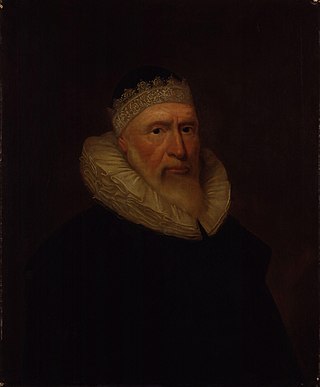
Sir Julius Caesar was an English lawyer, judge and politician who sat in the House of Commons at various times between 1589 and 1622. He was also known as Julius Adelmare.

Henry Montagu, 1st Earl of Manchester was an English judge, politician and peer.

Charles Abbott, 1st Baron Tenterden, was a British barrister and judge who served as Lord Chief Justice of the King's Bench between 1818 and 1832. Born in obscure circumstances to a barber and his wife in Canterbury, Abbott was educated initially at a dame school before moving to The King's School, Canterbury in 1769. He was noted as an excellent student, receiving an exhibition scholarship from the school in March 1781, when he matriculated at Corpus Christi College, Oxford. Here he was elected a fellow, and also served as a tutor to the son of Sir Francis Buller, which first made him consider becoming a barrister. He joined the Middle Temple in 1787, transferring to the Inner Temple in 1793, and was called to the Bar by the Inner Temple in 1796. Abbott was noted as an excellent barrister, earning more than any other during his time at the Bar, despite being considered unimaginative and a poor speaker. He was offered a position as a Justice of the Court of Common Pleas in 1808, which he turned down; he accepted the same offer in 1816, receiving the customary knighthood and being appointed a Serjeant-at-Law.

Sir James Whitelocke SL was an English judge and politician who sat in the House of Commons between 1610 and 1622.

Ralph Montagu, 1st Duke of Montagu was an English courtier and diplomat.

Robert Bertie, 1st Duke of Ancaster and Kesteven PC, styled17th Baron Willoughby de Eresby between 1666 and 1701, and known as 4th Earl of Lindsey between 1701 and 1706, and as 1st Marquess of Lindsey between 1706 and 1715, was a British statesman and nobleman.

Sir Edward Montagu of Boughton, Hanging Houghton and Hemington in Northamptonshire was an English lawyer and judge in the time of Henry VIII and Edward VI. He was Chief Justice of the King's Bench from 1539 to 1545 and Chief Justice of the Common Pleas from 1545 to 1553.
Willoughby Bertie, 4th Earl of Abingdon, styled Lord Norreys from 1745 to 1760, was an English peer and music patron.
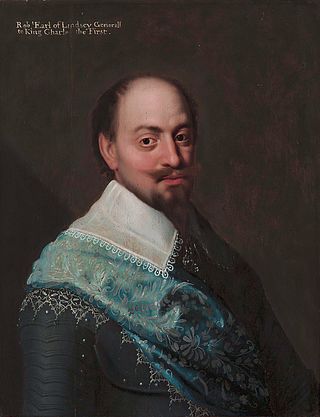
Robert Bertie, 1st Earl of Lindsey KG was an English peer, soldier and courtier.

Montagu Bertie, 2nd Earl of Lindsey, KG, PC was an English soldier, courtier, and politician who sat in the House of Commons between 1624 and 1626. He was created Baron Willoughby de Eresby by writ of acceleration in 1640 and inherited the peerage of Earl of Lindsey in 1642. He fought in the Royalist army in the English Civil War.
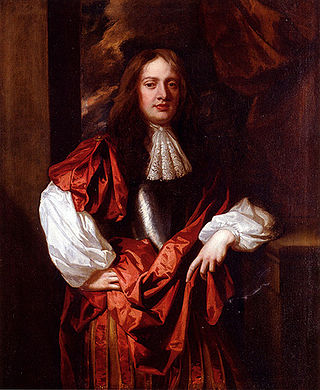
Captain Charles Bertie, of Uffington, near Stamford, Lincolnshire, was a British administrator, diplomat, and Tory politician who sat in the English and British House of Commons between 1678 and 1711. He rose to serve as Secretary to the Treasury under his brother-in-law, the Earl of Danby, from 1673 until 1679 but did not wield significant political power thereafter. He did, however, twice enjoy the office of Treasurer of the Ordnance before his death in 1711.

Peregrine Bertie was an English politician, the second son of Montagu Bertie, 2nd Earl of Lindsey. A member of the court party, later the Tories, he sat for Stamford from 1665 to 1679, and from 1685 to 1687. Most active in Parliament during the 1670s, he and other members of his family were consistent political supporters of Bertie's brother-in-law, the Duke of Leeds throughout several reigns. While he never achieved significant political stature, he did hold several minor government offices: he was a captain in the Royal Regiment of Horse Guards until 1679, and a commissioner of the Alienation Office and a customs officer. The death of his wife's brother brought the couple an estate in Waldershare, Kent, where Bertie ultimately settled. He sat for Westbury after the Glorious Revolution, but showed little political activity compared to others of his family. Bertie stood down from Parliament in 1695 and died in 1701, leaving two daughters.

James Bertie, 1st Earl of Abingdon, styled Hon. James Bertie until 1657 and known as the 5th Baron Norreys from 1657 until 1682, was an English nobleman.
Henry Powle was an English lawyer and politician who sat in the House of Commons at various times between 1660 and 1690, and was Speaker of the House of Commons from January 1689 to February 1690. He was also Master of the Rolls.
John Williams was a Welsh lawyer and writer on legal topics.
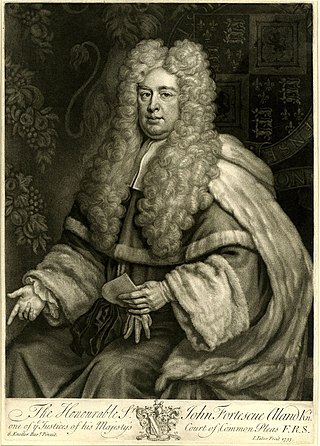
John Fortescue Aland, 1st Baron Fortescue of Credan, of Stapleford Abbotts, Essex, was an English lawyer, judge and politician who sat in the House of Commons for two years from 1715 to 1717. He wrote on English legal and constitutional history, and was said to have influenced Thomas Jefferson. A member of both the Middle Temple and Inner Temple, he became a King's Counsel in 1714 and was then appointed Solicitor General, first to the Prince of Wales and then to his father George I in 1715. After a short stint as a Member of Parliament, Fortescue Aland was knighted and elevated to the Bench as a Baron of the Exchequer in 1717. He was subsequently a justice of the Court of King's Bench (1718–1727) and of the Court of Common Pleas (1728–1746), save for a brief hiatus between 1727 and 1728 which has been attributed to George II's displeasure with one of his legal opinions.
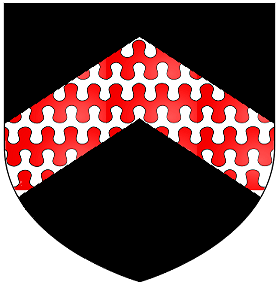
Sir William Hankford KB of Annery in Devon, was an English lawyer, and Chief Justice of the King's Bench from 1413 until 1423.
Francis Bramston or Brampston was an English judge and Baron of the Exchequer.
Sir Edmund Saunders was an English judge, promoted to a high position at the end of the reign of Charles II of England.
![]() This article incorporates text from a publication now in the public domain : Stephen, Leslie, ed. (1885). "Bertie, Vere". Dictionary of National Biography . Vol. 4. London: Smith, Elder & Co.
This article incorporates text from a publication now in the public domain : Stephen, Leslie, ed. (1885). "Bertie, Vere". Dictionary of National Biography . Vol. 4. London: Smith, Elder & Co.












